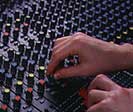| Author
|
You can't fix it in the mix!
|
Amygdala
Amygdala

Started Topics :
12
Posts :
175
Posted : Apr 26, 2005 13:46
|
Please read everything, before you fling me angry remarks 
There is a lot of talk about EQing and compression on this forum. The trend seems to be "if it doesn't sound good, compress it, and top of with EQing <insert generic buzzword such-as-sidechain at random positions>" - I have had several reviews in the 'new tracks' section stating plainly and simply "compress bass more"...
I don't now if this is the right place to speak out, but here goes. I know it's a matter of taste and subjectivity, but the aforementioned approach is (in my world) completely BS. My thoughts can be expressed with four simple letters: G-I-G-O - a well-known computerscience acronym for "Garbage in, garbage out". To carry the analogy to making music - if you pour garbage into your compressor, you are going to get compressed garbage out as a result... Garbage to the max! The same goes with EQing - if you use EQing to make up for some missing quality in a sound, all chances are, that in the mix, it's gonna sound even less qualitous (yeah, I made it up  ). Compression and EQ are not 'effects' in the same sense as delays and reverb (unless one wants the pumping effect of a compressor, or to significantly cripple a sound with EQ for the fun of it), and should not by applied to make up for missing aspects of a sound. ). Compression and EQ are not 'effects' in the same sense as delays and reverb (unless one wants the pumping effect of a compressor, or to significantly cripple a sound with EQ for the fun of it), and should not by applied to make up for missing aspects of a sound.
Case in point (from a hihat-snare-perc thread I read earlier: http://forum.isratrance.com/viewtopic.php/topic/61185/forum/2): Hats need more punch, oomph, presence, and what have we... If you want more punch, the first thing to consider (well, to do, actally) is to give the compressor the ol' heave-ho. Compressors kill dynamics - it's what they are made for. Rather (as suggested in the thread), fiddle with velocities to get groove and MORE dynamics - add funk and stir. To follow the GIGO-principle, start with some samples that have ”it”. Agreed, these are hard to come by, and are probably the result of other peoples intense manipulations (an example is the infamous 909 hats...). The programming is of course alpha and omega. To move further from the compressor-way of life, I actually sometimes use expanders on rhythm parts. Enveloping is very important too, but this counts as manipulating the rawmaterial, as opposed to compressing.
EQ'ing can do wonders indeed. I recently created a monstrous kick sound (at least I think so...), from a pretty lame sample - only by means of an EQ. I felt good and bad at the same time, because it was purely by luck, so I won't be able to do it again with any sample I come across. My knowledge, patience and ears are not equiped for that. Unless you are a bigshot mastering-engineer, yours probably aren't either. I totally recognize the skills of you people out there, but when it comes to EQing, they usually do more harm than good. Sometimes people compose and EQ by the VISUAL (!!!) feedback from spectrum analyzers, and the resulting sound LOOKS good, but sounds awfull.
All this is a reaction to the ”fix-it-in-the-mix” philosophy so many people subscribe to. My point is, make it sound good starting out, as early in the process as possible, and then 'effect' it to make it sound better. Most effects are not bandaids, that can be applied whenever something is not good enough – make it good enough first, then improve.
An exception to all this, is the use of compressor with vocals. This is a very good idea, but doesn't really apply to programmed music, where the composer controls the volume. Heck, if you get a good enough singer, compressing isn't needed there either 
Oh and last: If you compress to much, you'll sound like any other idiot boy-band on the local hitradio. No dynamics, no depth, no fun, no good – but hey, at least you'll spare the audience the bad experience, because they will tune out soon - ears get really tired from listening to overcompressed radio-ready music, unless on a car-stereo 
- I know I probably stepped on a lot of toes here, but let's hear some opinions. My knowledge of compressors, EQ and such is by no means perfect, and this is just a personal opinion – I will respect yours, but hold the right to disagree... |

|
|
fuzzikitten
Annunaki

Started Topics :
40
Posts :
603
Posted : Apr 26, 2005 13:55
|
I do believe a compressor can be used to give a sound more oomph, simply by using the attack to preserve the transients while compressing the sound (after the transients). This lets you boost the overall volume and thereby boost the transients in relation to the rest of the sound.
Compression isn't a bad thing, when used properly. And that's the hard part.  |

|
|
orik
IsraTrance Junior Member

Started Topics :
45
Posts :
317
Posted : Apr 26, 2005 14:23
|
amygdala-
i agree with most of you say here, but your
words seem to be pointed to those who collect
and tweak pluggins, and fart around for hourse on them (wich you can learn loads from...) instead of learnning how they work.
your descriptions on eq for example seamed
to talk (as i understood) refers mainly for
boosting, instead of for cutting, wich can
lots of times clear up parts in the mix,when used proparly...
i think you can sum it up saying,
learn how the tool your using works,
listen to how it sounds, and what it does,
dosnt rush anyware, when working on a sound,
dont rely alone on the visuals on the screen or what other people say about it (wich
effects your brain as well...)but take your
time untill it sounds right, no nead to compress the shit out of something in order for it to be phat....etc etc... |

|
|
PoM
IsraTrance Full Member

Started Topics :
162
Posts :
8087
Posted : Apr 26, 2005 14:27
|
|
i think it must sounds good without mixing, that way after mixing it sounds great , but if it sounds shit it ll still sounds shit in my opinion. |

|
|
phobium
Phobium

Started Topics :
14
Posts :
718
Posted : Apr 26, 2005 15:21
|
I totally agree. The way I look at it, mastering (eq/compression) shouldn't be all that important. The reason is simple : The mix should be very good from the start. Of course, if you got a shitty mix, mastering might save the track. But in general, I think mastering should just make the track sound even better.
However, using compression and eq on an artistic level is a whole different matter ... 
        ________________________ ________________________
www.phobium.net
http://phobium.bandcamp.com/
________________________ |

|
|
UnderTow

Started Topics :
9
Posts :
1448
Posted : Apr 26, 2005 16:05
|
I totaly abree with Amygdala. See my comments to dma in the "hATS' sNARES aND pERCUSSION" thread.
UnderTow |

|
|
vox

Started Topics :
2
Posts :
114
Posted : Apr 26, 2005 16:41
|
Quote:
|
On 2005-04-26 14:27, PoM wrote:
i think it must sounds good without mixing, that way after mixing it sounds great , but if it sounds shit it ll still sounds shit in my opinion.
|
|
well, i think you think wrong. something can sound great on its own, but can clutter the mix so hard that the overall mix sounds awful. fat trance leads and pads are especially notorious for this.
for example, take kick in moby's songs. in his last single (lift me up) the kick in the intro sounds awful, but when all other rythm parts kick in, the whole rythm sounds really good and doesn't clutter the mix.
and i also agree with amygdala. compression is completely overused nowadays. a friend of mine made one track (epic trance) and spent about 4-5 hours tweaking eq and compression parameters for tracks and group tracks. two weeks after he made a new track which sounded way better and somehow more defined and compact without a single eq in the track. go figure. that is the garbage in- garbage out philosophy.
        http://myspace.com/voxproject http://myspace.com/voxproject |

|
|
Spindrift
Spindrift

Started Topics :
33
Posts :
1560
Posted : Apr 26, 2005 17:29
|
I totally agree amygdala.
I have been going on abou the same thing a few times in here as well.
IMO the vast majority of beginners demos I hear is suffering badly from too much eq and compression and would most likely sound a lot better without anything.
Also much of the releases have in my taste far too controlled dynamics a clinical EQing. It's done in a professional way rather than with feeling many times.
Ideas like "taking out everything below 70hz make the bass punchier" or "eq all leads at 400hz to not cause phase shift in the bass region" or "compress all leads with a bit varying dynamics so no masking will happen" is really resulting in a very boring mix in the end that have very little depth and feeling in it.
A lot of the pop on the radio is more experimental and have rougher production than for example the spun crew.
The search for good sounds and synths and nice sounding software/hardware is a lot more important when it comes to making a nice mix.
It seems like it sounds to some like there is no skill required if you don't use every available tool to shape the sounds.
I do think that finding good sounds that fit together is enough of a skill and actually harder work many times than learing how to compress or EQ a sound that needs treatment.
My favorite synths is normally the ones with envelopes and frequency response that I lika and I hardly ever need to EQ or compress.
A sound that is really fat, ie have a packed amplitude scale and frequency spectrum, is just not possible to make fatter with compressors or EQs. It's only possible to make it thinner and thats what happens many times with untrained ears with less than ideal monitoring trying to compensate a great sound to suit less great circumstances.
Sure some times you want to have thinner sounds, but you are better off to start with a thin one then.
And sure you can beef up a thin sound as well, but if you have a fat sound to start with you will get a better result.
It all reminds me about metal guys practicing Yngwee Malmsteen solos all day on a really cheap and crap sounding guitarr.
Sure, if you get the teqnique you can do ok stuff on any guitarr.
But if you have a great sound you hardly need to play and can just hit a note and people will be astonished.
To find that guitar sound can take just as much effort as learning to play "the flight of the bumble bee" as fast as possible, but will in my taste result in music that speaks more to me at least.
        (``·.¸(``·.¸(``·.¸¸.·`´)¸.·`´)¸.·`´) (``·.¸(``·.¸(``·.¸¸.·`´)¸.·`´)¸.·`´)
« .....www.ResonantEarth.com..... »
(¸.·`´(¸.·`´(¸.·`´``·.¸)``·.¸)``·.¸)
http://www.myspace.com/spindriftsounds
http://www.myspace.com/resonantearth |

|
|
14-year old e-tard
IsraTrance Junior Member
Started Topics :
11
Posts :
797
Posted : Apr 26, 2005 18:06
|
Quote:
|
On 2005-04-26 13:46, Amygdala wrote:
Compressors kill dynamics - it's what they are made for.
|
|
You can also use a compressor to "renovate" the dynamics of a sound. For example you can compress the body of a snare drum, leaving the transient uneffected with a slower attack time and the use the make up gain to turn it up again.
This is not a way of "un-doing" any compression process that took place before hand...any smearing of the high frequencies, or artifacts caused from the original process, will still be there. But if you like the sound to start with and simply want a louder transient by means of compression, you can do so.
Good points overall.
        Me>You Me>You |

|
|
Amygdala
Amygdala

Started Topics :
12
Posts :
175
Posted : Apr 26, 2005 23:59
|
Thanks for all your replies... It's easy to agree with you, since you appear to agree with me 
Lately, I've been wondering, if there was an untold secret about compression I just didn't realize, but it seems I'm on the right track. I have tried to investigate the differences in envelopes on all my synthesizers (hard as well as soft), and can only conclude, that they make a world of difference - a sluggish envelope from one synth seems impossible to remedy by use of compression and EQing (in case of filter-enveloping). That's why it can be very frustrating to have a synth that delivers awesome quality waveform from the oscilators, but is incapable of enveloping it right - and have the opposite problem with another synth... The GIGO problem is in this case devastatingly depressing, and I guess theres no way around it, since the synth with great envelopes doesn't take input from external devices.
Yes, compression can be used for "artistic purposes", and I do so once in a while (although most people fail to see the "art" in there  ). Of course, dynamics can be retained - and sometimes even enhanced - by compression, but I find that this only happens on very rare occasions... And that is when the input fits the processing. But then, magic can happen! ). Of course, dynamics can be retained - and sometimes even enhanced - by compression, but I find that this only happens on very rare occasions... And that is when the input fits the processing. But then, magic can happen!
I particularly enjoy Spindrifts quote "taking out everything below 70hz make the bass punchier" - I've heard that advice before, and it physically sickens me... Don't worry so much about phase-shifts either - there can be quite a bit of magic hidden there as well...
I hoped for some opposers too... All the perspective is welcome, so bring it on  |

|
|
Jikkenteki
Jikkenteki

Started Topics :
20
Posts :
356
Posted : Apr 27, 2005 01:54
|
I agree with Amygdala and have been making statements against the "when in doubt, use compression" method that has been popular for a while now (when I bother to post at all these days I guess). I think the "compress, use eq" boom recently is just another case of a "production fad" going through the trance community. Having watched and participated regularly in various psy-trance related forums for I guess about 6 years now, I have noticed how about every 18 months or so, someone somewhere posts some great piece of advice or makes some comment that spawns a "movement" among the amateur artists which then slowly gets rammed down everyone's throats and the advice warped to an extreme that it starts to become counter-productive degree over the months to come until some new production trend comes along (anyone remember how a couple years ago there weren't so many comments about mastering, then suddenly it was hot to talk about mastering plug ins, etc, until it became the hot topic to tell everyone that only pros should do it and don't even think of concidering even to try mastering anything on your own, followed up by the compression and e.q. issue which seems to have stolen mastering's crown as trend of the moment). Heck if you think about it, this thread might even spawn the next "new movement" in trance production and recording.
        New Album: Jikkenteki - Flights Of Infinity New Album: Jikkenteki - Flights Of Infinity
Available for free at http://www.ektoplazm.com/free-music/jikkenteki-flights-of-infinity/
PAR-2 Productions http://www.par-2.com |

|
|
mubali
Mubali

Started Topics :
71
Posts :
2219
Posted : Apr 27, 2005 03:15
|
Personally I think that we've become really obsessed with sonic clarity. Everyone wants everything to be clear in the mix and each sound stands out. I personally believe that if my synthline gets lost, I need to find out why it does and rectify the situation. I know that I tend to overcompress things and tend to use compression on virtually everything. This also is due to being a dj first and writing music to be mixed with other artists. There is nothing more disheartening than mixing out of another released artists' track into your own and hearing the volume drop even though you have the gain turned up to where it looks right on a meter readout. I have been learning first to use less compression on my kick/bass combo and really experimenting with eq a lot more. To be perfectly honest, I cut off a lot of low end to my synths... I usually do a cut somewhere in the 400 range. It works a lot better if the meat of the sound isn't in that particular range.
When I first started producing, I had no real clue about setting your sound levels for the individual instruments. I went out and sought advice from an established producer. The advice really helped, but made me very vigilant about the individual sound channel levels. If something didn't sound loud enough at the volume level I had it set at, rather than use the volume slider, I'd compress the signal and limit the dynamic range on it. For me this worked for quite a long time, it's now that I am experimenting with the sound levels on stuff... I do agree with the GIGO idea, and you can't fix it in the mix if it doesn't really sound right, but at the same time compression can be your friend if you know what the hell you are doing. You just really have to invest time into learning your tools. Sometimes the best way to learn it is indeed to do it and learn from your mistakes.
The whole leaving the mastering to the engineers thing, on one hand I can completely understand, but how many of you have access to a mastering engineer for every song you write? If you produce and are a dj, how do you mix your own material with other released material and avoid the obvious sonic differential that will happen if you play something unmastered with a larger dynamic range? I personally feel that you should learn everything you can about the whole process of music making, from the songwriting to mastering.
I don't really do to much for the "mastering" end of my tracks. I usually just run it through a maximizing limiter and call it a day. If the mix is good, then no worries, but if it isn't then I need to go back and fix the mix.
        An Eagle may soar, but Weasels don't get sucked into jet engines. An Eagle may soar, but Weasels don't get sucked into jet engines. |

|
|
Freeflow
IsraTrance Full Member

Started Topics :
60
Posts :
3709
Posted : Apr 27, 2005 04:23
|
I also agree with Amygdala to a certain degree!
what is often missed is our best tool, the volume fader! even i ignore it at times, hehe
if to use any artists as an example i would say Logic Bomb, it sounds as they dont use any compression at all on bass and kick, at least not their early stuff, like the unlimited album, if they do they only use very little, and i really like that album, if i want it louder i turn up the volume, but sometimes i can think that their lowend is a bit flabby at high volumes, like a rumble.
there is nothing wrong with having a controled lowend in dance music in my opinion. but that can often be fixed in the mastering stage by some multiband compression.
the point being that compression is good with moderation. and of course using it as a creative effect is also good. anything is good as long as its good 
a good trick is often to mix the compressed signal with the uncompressed. you get the benefits of compression and the dynamics is keept, at least its works good on percussion loops.
Compression is a great tool, but hard to grasp, im still working on getting to know compression better, and as long as we want to learn more and of course use our ears i think we can only get better results.
and a tip is to use compression on audio to see what happens to the signal, instead of listening for something that has to be trained to hear. but i agree with you orik, one should not stare him self blind on visuals, i know i have done that at times and the result is most often not good.
nice thread with some nice ideas! thanks guys  |

|
|
br0d
IsraTrance Junior Member

Started Topics :
12
Posts :
355
Posted : Apr 27, 2005 07:12
|
Trying to fix a mix in mastering is like:
-Trying to fix a car engine with a sledge hammer
-Trying to solve a rubiks cube with boxing gloves on
-Your analogy here |

|
|
EYB
Noized

Started Topics :
111
Posts :
2849
Posted : Apr 27, 2005 10:07
|
I confused now!
U talk about mastering or u talk about mixing?
Sure u can't change/fix the mix with mastering.
But the topic is: "You can't fix it in the mix! "
And there lies the problem, U NEED TO FIX it in the mix IF THERE IS SOMETHING TO FIX!
        Signature Signature |

|
|
|